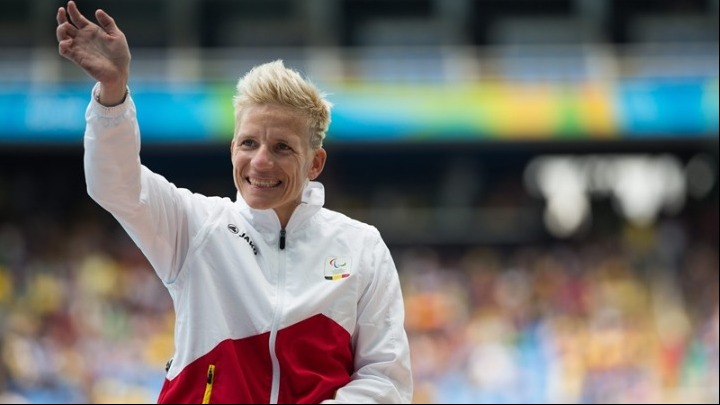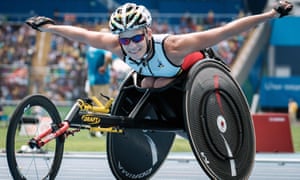
«Εχω στην διάθεση μου όλα τα απαραίτητα έγγραφα.
Ομως εξακολουθώ να απολαμβάνω την κάθε στιγμή»,
δήλωνε τον Σεπτέμβριο του 2016 η τότε 37χρονη Παραολυμπιονίκης, Μαριέκε Βέρβουρτ
και προσέθετε:
«Οταν θα έλθει η στιγμή που οι κακές ημέρες θα είναι περισσότερες από τις καλές, τότε θα
κρατήσω στα χέρια μου τα έγγραφα της ευθανασίας. Ομως αυτή η στιγμή δεν έχει έλθει
ακόμη. Οταν δεν είχα αυτήν την δυνατότητα, είχα σκεφθεί την αυτοκτονία.
Η συγκεκριμένη επιλογή, κάνει τον κόσμο να ζει περισσότερο.
Εγώ υπέγραψα τα έγγραφα μου το 2008 και κοιτάξτε, βρισκόμαστε στο 2016 και κατέκτησα το αργυρό μετάλλιο στους Παραολυμπιακούς Αγώνες.
Ο φόβος μου για τον θάνατο έχει φύγει.
Δεν θέλω να υποφέρω όταν θα πεθαίνω»...
Και τελικά, τρία χρόνια αργότερα 22.10.2019ηλθε αυτή η ημέρα...
Η Βελγίδα πρωταθλήτρια, η οποία στους δρόμους με αναπηρικό αμαξίδιο, κατέκτησε μετάλλια στους Παραολυμπιακούς Αγώνες του Λονδίνου (2012) και του Ρίο Ντε Τζανέϊρο (2016), επέλεξε την ευθανασία, όπως ανακοινώθηκε επίσημα από τις Αρχές της γενέτειρας της βελγικής πόλης, Ντιστ.
Paralympics
Belgian Paralympian chooses to end own life after battle with incurable spinal disease
Social Sharing
5-time medal-winner Marieke Vervoort had signed legal euthanasia papers

Five-time Paralympic medal winner Marieke Vervoort signed her
legal euthanasia papers She said she wanted to be remembered as the lady who was
"always laughing, always smiling"

https://www.cbc.ca/sports/paralympics/paralympian-marieke-vervoort-euthanasia-1.5331876?utm_content=buffer2b59a&utm_medium=social&utm_source=twitter.com&utm_campaign=buffer

Paralympian Marieke Vervoort said when
the day arrived, she had signed the euthanasia papers
and was prepared to end her life.
That day came on Tuesday in her native Belgium, her death confirmed in a statement
from the city of Diest.
Vervoort, 40, won gold and silver medals in 2012 at the London Paralympics in wheelchair racing, and two more medals three years
ago in Rio de Janeiro.
In an interview at the Paralympics in Rio, Vervoort described living with unbroken pain
from an incurable, degenerative spinal disease. She talked of sleeping only 10 minutes some nights, described severe pain that caused others to pass out just watching her,
and detailed how sport kept her alive.
“It’s too hard for my body,” Vervoort said in the 2016 interview. “Each training I’m suffering because of pain. Every race I train hard. Training and riding and doing competition are medicine for me. I push so hard – to push literally all my fear and everything away.”
Vervoort was a strong advocate of the right to choose euthanasia, which is legal in Belgium. Like training hard, she said it gave her control and put “my own life in my hands”.
“I’m really scared, but those (euthanasia) papers give me a lot of peace of mind because
I know when it’s enough for me, I have those papers,” she said. “If I didn’t have those papers, I think I’d have done suicide already. I think there will be fewer suicides when every country has the law of euthanasia. I hope everybody sees that this is not murder, but it makes people live longer.”
Vervoort also had epileptic seizures and had one in 2014 when she was cooking pasta and spilled boiling water over her legs. That resulted in a four-month hospital stay.
A loyal Labrador named Zenn began staying with her, pawing her when a seizure was
about to occur. Zenn also pulled her socks out of the sock drawer, she said, and helped carry groceries home when Vervoort bought too much. “When I’m going to have an
epileptic attack, she warns me one hour before,” Vervoort said. “I don’t know how she
feels it.”
Vervoort said she kept pushing back the day of her death, knowing it could come anytime — as it can for anyone. She said she can be pain-free one minute, and nearly pass out a few minutes later. “You have to live day-by-day and enjoy the little moments,” she said. “Everybody tomorrow can have a car accident and die, or a heart attack and die. It can be tomorrow for everybody.”
Vervoort called herself a “crazy lady”. She talked of flying in an F-16 fighter jet, riding in a rally car, and she was curating a museum of her life going back to at least 14 when she was diagnosed with her rare illness. She had spikey hair and wanted to be remembered as the lady who was “always laughing, always smiling”.
“I feel different about death now than years ago,” Vervoort said. “For me I think death is something like they operate on you, you go to sleep and you never wake up. For me it’s something peaceful.”


Δεν υπάρχουν σχόλια:
Δημοσίευση σχολίου